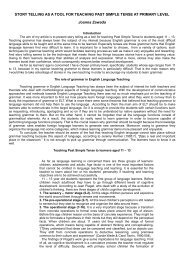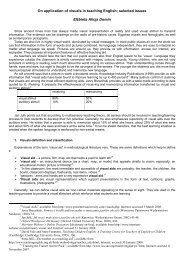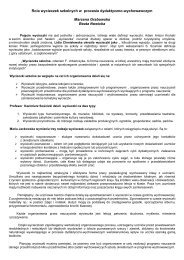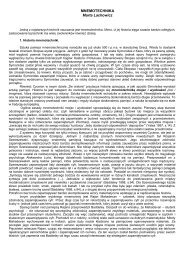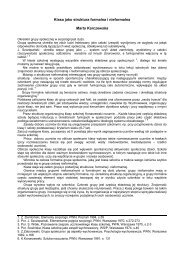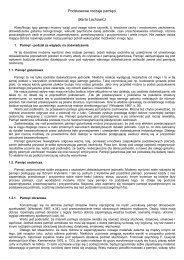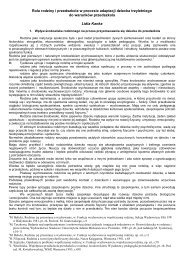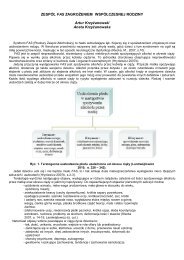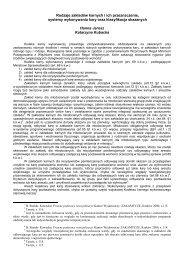EXTROVERSION/INTROVERSION SYLWIA GRABIEC
EXTROVERSION/INTROVERSION SYLWIA GRABIEC
EXTROVERSION/INTROVERSION SYLWIA GRABIEC
You also want an ePaper? Increase the reach of your titles
YUMPU automatically turns print PDFs into web optimized ePapers that Google loves.
By studying the differences between extroverts and introverts teachers can predict what kind of activities students will<br />
enjoy, what sort of teaching methods they require and what their learning styles are. Burruss and Kaenzig (1999) claim<br />
that extroverts and introverts need different kinds of instruction. Introverts prefer to work on their own than in groups, they<br />
do not like being in the centre of attention and need time and space to complete the tasks. Many of these students enjoy<br />
lectures and deductive methods of teaching. They think carefully before speaking, do not like sharing their inner thoughts<br />
with others unless they know them well and they prefer writing than speaking that makes oral skills more difficult to<br />
acquire. The strategies used in the classroom should include: small group interaction, relaxed atmosphere, independent<br />
studies and role-plays. The students need to know what they are expected to do and have suitable conditions to<br />
concentrate. On the other hand, there are extroverts who require high stimulation, cooperating with others and movement<br />
in order to learn. They also like open discussions and discovery activities. They are not afraid of making mistakes and<br />
experimenting with the language. Their personality traits facilitate the development of general oral communicative<br />
competence, which requires face to face interaction. Teachers should be aware of personality characteristics among<br />
learners and use a great variety if teaching methods in order to achieve the best results (Burruss and Kaenzig 1999).<br />
2 Second language acquisition studies<br />
Ellis (1994) presents two major hypotheses concerning the relationship between extroversion/introversion and L2<br />
learning. The first is that extroverted learners will do better in acquiring basic interpersonal communication skills (BICS).<br />
Extroverts are more eager to talk, to join the groups and participate in classroom activities. They will use the language<br />
more in and outside the classroom. The second hypothesis is that introverted learners will do better at developing<br />
cognitive academic language ability (CALP). Entwistle and Wilson (1977) claim that introverts will achieve more because<br />
they have better long-term memory than extroverts. Besides, they take learning a language in a more serious way and<br />
spend more time on reading and writing due to their personality traits. The extroverts are not able to concentrate for a<br />
long time and are too sociable to learn with the same attention (Eysenck 1957).<br />
Many investigators tried to support these hypotheses with research. Skehan (1989) makes a review of the actual<br />
research results in order to find the relationship between the theory and practice. He notices that some researchers did<br />
not obtain any positive correlations between extroversion/sociability and language achievement, (for example: Smart at<br />
al. 1970; Genessee and Hamayan 1980). On the other hand, Strong (1983) showed that extroversion was an advantage<br />
as far as communication skills are concerned.<br />
A positive relationship between extroversion and oral fluency was also found by Rossier (1976) and Pritchard<br />
(1952).<br />
Skehan (1989) also presents an amended version of the table grouping the studies of extroversion, which was<br />
provided by Strong (1983):<br />
Table 2.3. Second language acquisition studies divided according to type of language sampled and presence<br />
or absence of relationship with social traits.<br />
Positive relationship<br />
Non-relationship<br />
Pritchard (1952) SSC FL Genesse (1980) YC FL Quest<br />
Obser<br />
Rossier (1976) A Nat ?<br />
Suter (1977)<br />
Ely (1986)<br />
A<br />
A<br />
Nat<br />
FL<br />
Quest<br />
Quest<br />
NCL Wong-Fillmore (1976) C Nat Obser Strong (1983) YC Nat Quest<br />
Strong (1978) YC Nat ?<br />
Strong (1983) C Nat Obser<br />
Morrison (1961) A FL ?<br />
LTL Chastian (1975) A FL Obser<br />
Rossier (1976) A Nat ?<br />
Smart (1970) A FL Quest<br />
Swain (1976) YC FL Rating<br />
Chastian (1975) A FL Quest<br />
NCL= Natural communicative language LTL = Linguistic task language<br />
SSC = Secondary School Children YC = Young children A = Adults<br />
? = Value not known Quest = Questionnaire<br />
The results presented in the table above show that positive relationships between extroversion and performance<br />
can be observed when the studies are conducted in naturalistic learning situations and when they measure natural<br />
communicative language. It could be also noticed that every study based on observations provides a positive relationship<br />
(Skehan 1989).<br />
Brown (1994:147) claims that “extroversion may be a factor in the development of general oral communicative<br />
competence, which require face to face interaction, but not in listening, reading and writing.”<br />
Personality characteristics are strongly related to other variables of the learners. Wankowski (1973) studied the<br />
relation between extroversion/introversion and age. He observed that extroverts do better in a primary school, however,<br />
the situation changes at higher education where introverts are more successful. This fact can be connected with the<br />
instruction learners are usually provided at different levels of education. Methods used with younger learners follow<br />
preferences of extroverts, whereas the tasks applied for teenagers and adults are more suitable for introverts (Skehan<br />
1989).<br />
Larsen-Freeman and Long (1991) attempt to find explanations why there is so much diversity among research<br />
results connected with studying personality and language achievement. The first reason for that can be the difficulty in<br />
measuring personality traits. If the tests used are not valid the research will give false results. The second issue worth<br />
2



